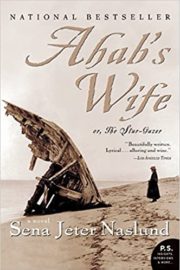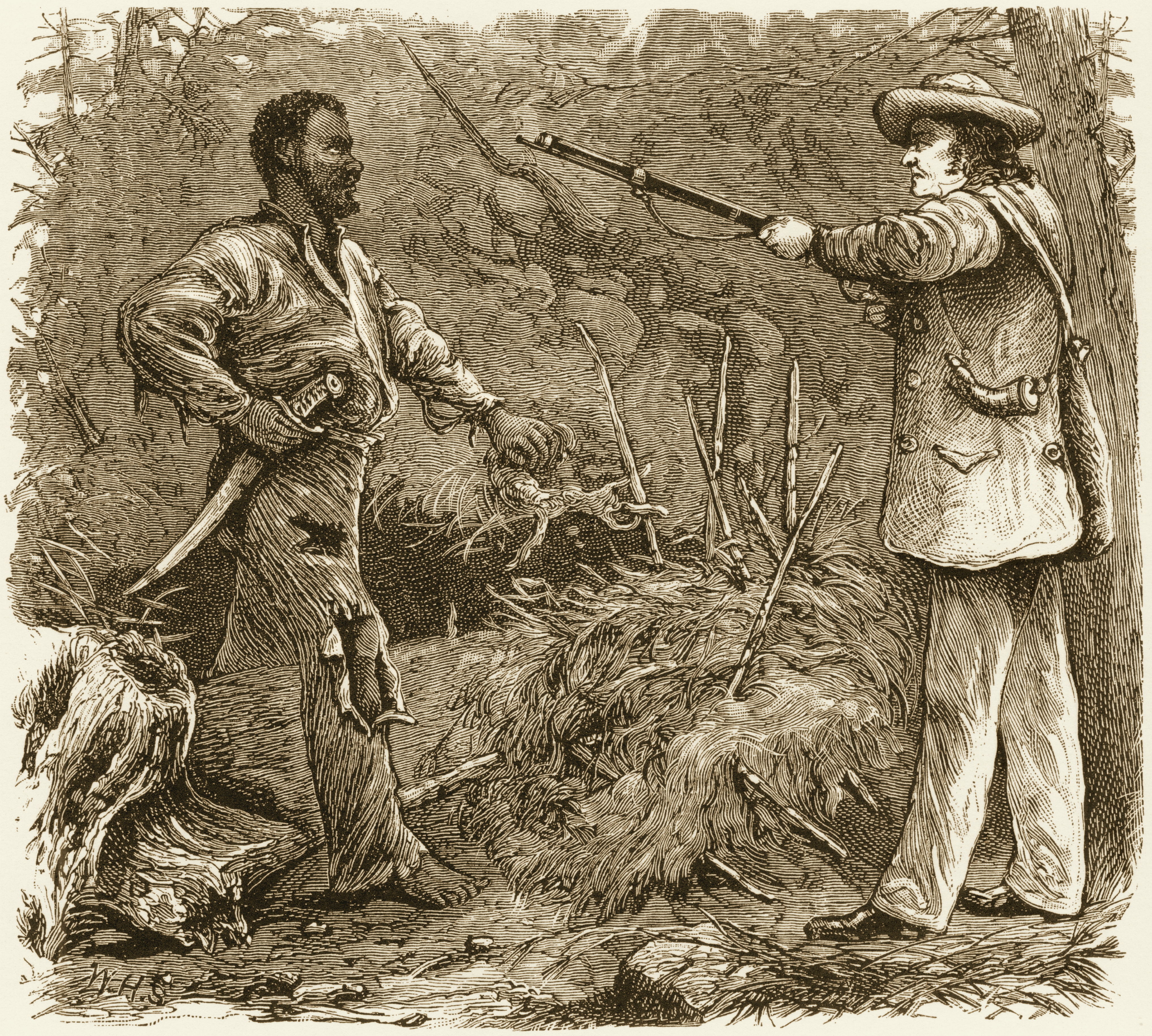When a book begins with this opening sentence - "Captain Ahab was neither my first husband nor my last" - it is difficult not to continue reading to find out the answers.

Contact US!
Have a question? Suggestion?
by Sena Jeter Naslund
Ahab’s Wife: Or, The Star-gazer by Sena Jeter Naslund is a book I could not put down once I finished the first chapter. “Captain Ahab was neither my first husband nor my last.” is one of the most-recognized first sentences in literature–along with “Call me Ishmael.”
Sena Jeter Naslund has created a transcendent heroine – Una Spenser – who is as memorable as Ahab. Una’s universe spans a time that begins to redefine both women and men.
After a spellbinding opening scene, the tale flashes back to Una’s childhood in Kentucky; her idyllic adolescence with her aunt and uncle’s family at a lighthouse near New Bedford; her adventures disguised as a cabin boy on a whaling ship; her first marriage to a fellow survivor who descends into violent madness; courtship and marriage to Ahab; life as mother and a rich captain’s wife in Nantucket; involvement with Frederick Douglass; and a man who is in Nantucket researching his novel about his adventures on her ex-husband’s ship.
Ahab’s Wife is a breathtaking, magnificent, and uplifting story of one woman’s spiritual journey, informed by the spirit of the greatest American novel, but taking it beyond tragedy to redemptive triumph.
Having read this book, I can easily understand why my wife loved the book and encouraged me to read it. Her life story was much like Una’s, an uplifting story of her spiritual journey and her quest to repair the world.
Subscribe to Sharing Jan's Love Newsletter!






by Geraldine Brooks
I started reading “Year of Wonders: A Novel” by Geraldine Brooks today. It is a compelling story set in 17th-century England about a village that quarantines itself to stop the spread of the plague. The book is written by the author of “The Secret Chord” and “March,” both of which won the Pulitzer Prize. Inspired by the events in Eyam, a village in the rugged hill country of England, “Year of Wonders” offers a richly detailed portrayal of a significant historical moment.
The plot begins when an infected bolt of cloth arrives from London, bringing the plague to an isolated village. A housemaid named Anna Frith emerges as an unlikely heroine and healer. Through Anna’s perspective, we experience the fateful year of 1666 as she and her fellow villagers confront the outbreak of disease and the rise of superstition. As death visits each household and villagers turn from prayer to fear-driven witch-hunting, Anna must find the strength to face the breakdown of her community and the temptations of forbidden love. Her struggle for survival and growth transforms a disastrous year into an extraordinary “year of wonders.
Written with remarkable emotional depth, the novel introduces, according to The Wall Street Journal, “an inspiring heroine” and skillfully weaves themes of love and learning, loss and renewal into a captivating and unforgettable narrative.
by Lily King
Writers and Lovers by Lily King is a page-turner of a book. From page one, I was engaged with Casey and wanted to continue reading to find out how she resolved the crises of her life.
The loss of her mother was a constant reminder of my loss. Although she mourned in a different way than I am, there was much we had in common. The big difference was she was writing a novel about her mother, and I am only doing journal entries and occasional posts.
Blindsided by her mother’s sudden death and wrecked by a recent love affair, Casey Peabody has arrived in Massachusetts in the summer of 1997 without a plan. Her mail consists of wedding invitations and final notices from debt collectors. A former child golf prodigy, she now waits tables in Harvard Square and rents a tiny, moldy room at the side of a garage where she works on the novel she’s been writing for six years. At thirty-one, Casey is still clutching onto something nearly all her old friends have let go of: the determination to live a creative life. When she falls for two very different men at the same time, her world fractures even more. Casey’s fight to fulfil her creative ambitions and balance the conflicting demands of art and life is challenged in ways that push her to the brink.
Writers & Lovers follows Casey–a smart and achingly vulnerable protagonist–in the last days of a long youth, a time when every element of her life comes to a crisis. Written with King’s trademark humor, heart, and intelligence, Writers & Lovers is a transfixing novel that explores the terrifying and exhilarating leap between the end of one phase of life and the beginning of another.
I very much recommend this book and this writer.
by Sarah Rose Etter
I started reading “Ripe: A Novel” by Sarah Rose Etter today. This book has won awards and is highly praised by Roxane Gay for its uniqueness and brilliance. It tells the story of a woman in Silicon Valley who must choose how much she will sacrifice for success. Fans of “My Year of Rest and Relaxation” and “Her Body and Other Parties” will enjoy this surreal tale.
Cassie has worked at a Silicon Valley start-up for a year but feels stuck in a corporate nightmare. The long hours, toxic bosses, and unethical projects are taking a toll on her. She has a hard time reconciling the stark contrast between the abundance of wealth and the poverty and suffering that exist side by side in the city. Cassie observes Ivy League graduates complaining about snack options in a conference room overlooking unhoused people bathing in the bay. She’s witnessed start-up burnouts who throw themselves in front of commuter trains and men who light themselves on fire in the streets.
Even though Cassie is often by herself, she never feels entirely alone. Since she can remember, she has had a tiny black hole that is always with her. This black hole feeds off her feelings of sadness and worry, getting bigger or smaller depending on how much she struggles. While it watches her, it also waits patiently. Its powerful force keeps pulling Cassie closer as everything in her life seems to fall apart.
Cassie finds herself pregnant unexpectedly while dealing with her CEO’s illegal demands. She must weigh the benefits of Silicon Valley against the risks. Ripe follows the journey of one millennial woman through the absurdities of modern life, offering a sharp yet vulnerable, unsettling yet darkly comic commentary on our late-capitalist hellscape.
The Jan Lilien Education Fund sponsors ongoing sustainability and environmental awareness programs. Gifts made this month; I will match dollar-for-dollar. All donations are tax-deductible.
I receive a commission when you buy a book or product using a link on this page. Thank you for supporting Sharing Jan’s Love blog.
by Colin Walsh
Today, I started reading “Kala: A Novel” by Colin Walsh, a gripping literary page-turner from a rising Irish talent. Former friends, estranged for twenty years, reckon with the terrifying events of the summer that changed their lives. Three old friends are reunited in the seaside town of Kinlough, on Ireland’s west coast, for the first time in years.
Helen, Joe, and Mush were part of an original group of six inseparable teenagers in the summer of 2003, with motherless, reckless Kala Lanann as their group’s white-hot center. Soon after that summer’s peak, Kala disappeared without a trace.
Now it’s fifteen years later:
But human remains are discovered in the woods. Two more girls have gone missing. As past and present begin to collide, the estranged friends are forced to confront their involvement in the events that led to Kala’s disappearance.
Against the backdrop of a town suffocating on its secrets, in a story that builds from a smolder to a stunning climax, Kala brilliantly examines the sometimes brutal costs of belonging and the battle in the human heart between vengeance and forgiveness, despair and redemption.
by Diana Evans
I just started reading A House for Alice: A Novel by Diana Evans. The story is set against a complicated political backdrop but is filled with hope, humor, and humanity. A House for Alice explores the scars of grief and betrayal across generations and reveals the secrets we keep from our loved ones.
The novel opens with two tragedies that occur in London. The first is the Grenfell Tower fire, which took many lives. The second is the death of Cornelius Winston Pitt, a family patriarch who dies alone. A House for Alice is a beautiful and poignant story about a family of women shaken by loss and searching for closure.
The family matriarch, Alice, has lived in England for fifty years but longs to spend her remaining years in her homeland, Nigeria. Her three daughters are divided on the matter. The youngest daughter, Melissa, is also struggling with the aftermath of her failed relationship. The family’s foundational pillars of trust, love, and cultural identity begin to weaken as they navigate these difficult times.
The Jan Lilien Education Fund sponsors ongoing sustainability and environmental awareness programs. Gifts made this month; I will match dollar-for-dollar. All donations are tax-deductible.
I receive a commission when you buy a book or product using a link on this page. Thank you for supporting Sharing Jan’s Love blog.
by Joseph O'Neill
Today, I dove into “Godwin” by Joseph O’Neill, the brilliant mind behind “Netherland,” which snagged the title of Best Book of the Year from the New York Times Book Review. This captivating tale follows the adventure of two brothers embarking on a globe-trotting quest to find an extraordinary African soccer prodigy—someone who might transform their lives forever. The thrill of their journey and the promise of discovery have me hooked!
Mark Wolfe, a brilliant self-thwarting technical writer, lives in Pittsburgh with his wife, Sushila, and their toddler daughter. Born and raised in the United Kingdom, his half-brother Geoff is a desperate young soccer agent. He pulls Mark across the ocean into a scheme to track down an elusive prospect known as “Godwin“—an African teenager Geoff believes could be the next Lionel Messi.
Narrated in turn by Mark and his work colleague Lakesha Williams, Godwin is a tale of family and migration as well as an international adventure story that implicates the brothers in the beauty and ugliness of soccer, the perils and promises of global business, and the dark history of transatlantic money-making.
As only he can do, Joseph O’Neill investigates the legacy of colonialism in the context of family love, global capitalism, and the dreaming individual.
Mr. O’Neill was born in Ireland and grew up in Mozambique, Iran, Turkey, and Holland. His previous novels include the PEN/Faulkner Award-winning Netherland and the Booker Prize long-listed The Dog. O’Neill’s short fiction appears regularly in The New Yorker and his political essays in The New York Review of Books. He lives in New York City.
When you purchase a book through one of my links, I earn a small commission that helps support my passion for reading. This contribution allows me to buy even more books to share with you, creating an incredible cycle of discovering great reads together! Your support truly makes a difference!